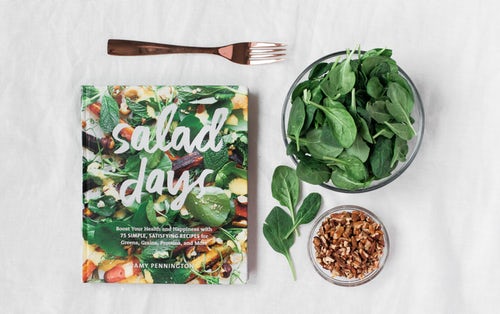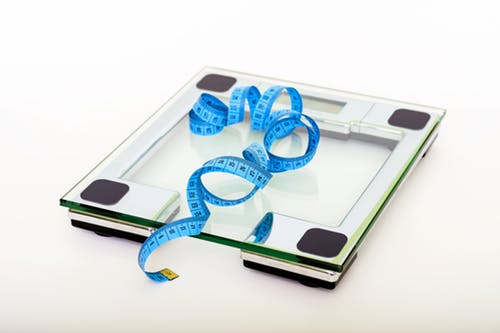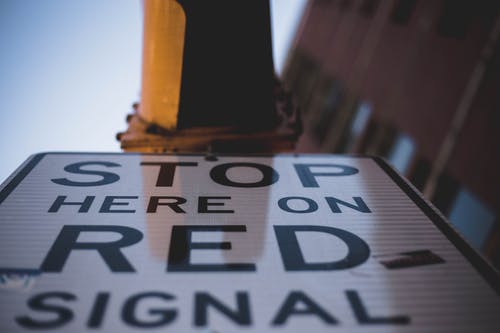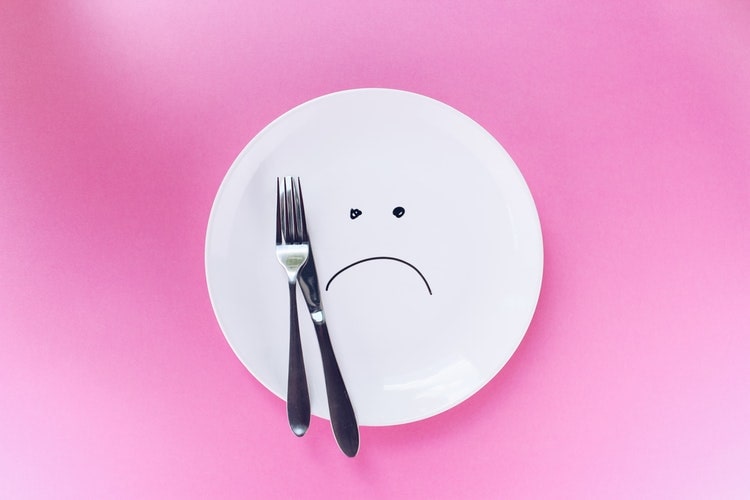Are you hearing about the benefits of fasting yet finding it (or just the thought of it) challenging?
There’s a reason for this and that is that your body is designed to eat, it runs of the energy liberated from food and to ensure you eat your body has in place many mechanisms to prevent you from not doing it, to try to let you know something is wrong when you’re not eating and most of all to try to get you to do something about it (eat).
I’ve heard the recommendation to ‘push through’ this uncomfortable period with the reassurance that your body will readjust to lack of food and with time and practice it will become easy and every time I hear this illogical ‘logic’ the picture of that little emoji palming his forehead pops into my mind (cue exasperated sigh). You know what else you can ‘push through’ until, with time and practice, it becomes easy? Smoking. No one enjoys those first few disgusting cigarettes but with time and practice your mind re-associates smoking with something else (relaxation, strength, sexy) to justify your continuation doing it and it does indeed get easier.
However, it still remains that there’s a reason inhaling carcinogenic smoke into your lungs is physiologically and psychologically challenging those first few times and that is because your body knows it is damaging! And the same holds true for fasting.
When you skip core meals you put your body into stress because it thinks it is at risk of starvation. Your body does not know how long this food deprivation will last what it does know is that the longer it goes on the less able it is to do all the things it wants to do, the more damage it is unable to repair and the less likely it will be that your body can reverse any damage therefore your body’s goal is a heightened focus on getting food!
In this post we are going to look at how your body responds to fasting, dispel 4 of the most frequently claimed benefits of fasting and a couple of questions for you to answer that will give you a clear ‘yes’ or ‘no’ answer as to whether fasting is for you. But first…
What is Fasting?

There are many different types of fasting diets and today we will be specifically referring to intermittent fasting, 2 of the most popular methods of this are:
- Fasting (or not eating or drinking any foods that supply calories) for 16 consecutive hours in any one day with an 8-hour time period over which you eat all your food for that day.
and
- Fasting for 24hrs on two (non-consecutive) days of the week.
Why are People Doing it?

Intermittent fasting is promoted to:
- Increase energy
- Build muscle
- Cause weight loss
- Increase lifespan and decrease your risk of diseases associated with ageing
Your Body on Fasting

Under normal eating conditions, that is consuming regular meals containing good amounts of all 3 of the energy yielding macronutrients (carbs, fat and protein) and micronutrients your body utilises carbohydrate (sugar) as its preferred fuel source supplying about 50% of your energy needs, then fat supplying just over a third and lastly protein at about 18%1. Because your body has a limited ability to store carbohydrates (in the form of glycogen in your liver and muscles) after an overnight fast (8-14hrs) these stores are used up and your body switches from using predominantly carbohydrates to using predominantly your fat stores. The benefits of fasting are claimed to be attributed to this change in dominant fuel source.
Your body is designed to be capable of going periods without food in fact the average person can survive a few months without food, however the key word here is SURVIVE which is certainly far from maintaining a rich, busy or meaningful lifestyle. Yes, your body can adapt to a wide variety, quantity, quality and timing of food intakes however, there is a big difference between being able to and doing so being good for you and again an even bigger difference between capable and it being optimal for you and the goals you want to achieve and the quality of life, contributions and the interactions you want to experience. Just because you can doesn’t mean it is best.
In order to go long periods without eating would require you to meet your energy and micronutrient needs in less meals that is if you were to maintain or improve your health (the whole goal of doing it in the first place right?). Just to be clear here we’re back on the topic of intermittent fasting, so we’re talking 16-24hrs without eating, not months because there are no benefits (true, false or otherwise) claimed to be associated with fasting for weeks or months. That’s starvation. Evidently consistently meeting all your nutritional needs over fewer meals poses a challenge for many of us depending on work and life situations (and let’s face it who isn’t busy and important?…) because your meals would have to be well planned especially if you are someone who generally meets a large proportion of your nutritional needs through snacking which many of us do.
If you’re thinking along the lines of “surely the logistics and inconveniences of fasting are a good trade for the desired health benefits listed above?…” then let’s together take a look as to whether this is the trade you are in fact signing up for…
Will Fasting Give Me More Energy?

It is well known that a key adaptive mechanism of mammals (of which you will know you are a part if you are familiar with the lyrics of 90s hit ‘Bad Touch’ by the Bloodhound gang) to food deprivation is to increase mobility presumably to enhance the chances of locating food. However, what we also know is that this is a short-term fix for a short-term problem and once food is located the animal (or human) can again relax. Therefore, an anxiety fuelled burst of energy when you’re fasting (hungry) does not mean that this is good for you or that you’ve improved your energy levels it is your body’s desperate attempt to make you seek the food you need.
After the initial energy rush that some people experience and use as a means of promoting fasting it is more common for people to experience increased tiredness and in response to this as far as I can tell those who promote fasting say to simply take more breaks and have naps when this happens. I don’t know about you but fitting breaks and naps into most of my days multiple times a day is not conducive with what I want to get done, achieve, feel, be and do especially not when there is a much easier option I can choose… Eat! No amount of sleep, breaks, stress management techniques or naps are going to revitalise your body when you’re low on the one thing it runs off; energy (aka food).
I can guarantee you no top athlete or performance-based star is restricting their calorie intake to get more energy! (other than the obvious need for this in physique or weight-controlled competitions). The very logic of it just doesn’t stack up and you don’t have to have a chemistry degree to understand that in order to perform well mentally and physically you need to fuel your body well, to perform exceptionally you need to fuel your body exceptionally.
Will Fasting Help Me Build Muscle?

Anabolic processes, that is the processes which synthesise (or build up) any of the substances within our bodies (muscle included) can only proceed in the presence of sufficient nutrition. If you need to read that sentence again.
During fasting your body is geared towards conserving energy (remember it doesn’t know how long its energy stores are going to have to last it) therefore while your body is set on conserving your muscle mass it’s certainly not working to increase it. Furthermore, you will feel like working out a hell of a lot less than if you supplied your body with adequate energy. What we also know is that your body prefers and makes better use of dietary protein (and many vitamins and minerals) if it is eaten in small amounts over the day2 and in particular if your main goals are muscle building having adequate nutrition on board before a workout as well as within a one hour period after a workout will optimise your body’s ability to synthesis new protein and repair the damage3.
Will Fasting Help Me Lose Weight?

Fasting will not of and by itself cause weight loss unless there is a corresponding decrease in energy intake which makes the fasting part obsolete because intermittent fasting does not necessitate a decrease in overall calorie intake and often can have the opposite effect of increasing calorie intake because when you are fasting you are hungry and when you get to that one meal you’re ‘allowed’ to have for the day you are more likely to eat large amounts of easily prepared, high energy dense foods than if you are well fed and able to make more conscious and healthful food choices. Remember your body’s response to lack of food is to seek and eat the highest calorie foods as quickly as possible and I have no doubt this natural response would cause more than a little psychological distress for many people.
What is also true when you have not eaten for extended periods of time is that your metabolism slows down, again as a measure to conserve the energy stores you have and make them last as long as possible which is going to make weight loss harder and can also cause metabolic damage in the long run further adding to the difficulty of losing weight.
Will Fasting Prevent Disease & Help Me Live Longer?

What is acknowledged in the literature is that the various fasting approaches have limited impact on aging and the development of diseases for which the risk goes up with aging (which is most diseases including type II diabetes, Alzheimer’s disease and cancer) unless they are combined with high-nourishment diets. Which to me in layman’s terms translates to something like this ‘you can try fasting but it will only be good for you if you also eat a great diet’ in which case I wouldn’t attribute the health gains to the fasting at all but to the great diet you’re now eating.
The obvious question then is why not just eat that great diet now without the potential adverse health effects of the fasting part?… For anyone that is wondering what a “high-nourishment” diet is, it would be eating along the lines of those dietary patterns consistently associated with health and healthy ageing of which we generally take the Mediterranean and Okinawa diets as gold standard (please let me know if you would like to read future posts on the principals and benefits of these eating patterns? and for now check out my earlier blog post What is Healthy Eating Anyway?).
The logical question to ask now is “if fasting doesn’t improve energy, build muscle, cause weight Loss or prevent common diseases of ageing what does it do?”…
Fasting Affects Your Sleep, Hormones and Digestion
Your circadian rhythm, endocrine and digestive systems are all influenced by your eating habits (read; every part your body is affected by your eating habits). Low calorie intake even for just two days a week will interfere with all these systems and processes which means increased risk of sleeping problems, depressed mood, lowered libido and concentration as well as impaired digestion and metabolic damage are all very real side effects of intermittent fasting.
I Am Still on the Fence… Give Me a Yes or No, Should I Give Fasting a Go?

If you answer yes to any of the following do not go on a unsupported (by a dietitian) fasting or calorie restriction diet of any kind if you are pregnant, trying to get pregnant or breastfeeding, have menstrual irregularities, blood sugar disorders, are on medications, are prone to illness (calorie restriction dampens your immune system), have gut or thyroid issues, a history of eating disorders, obsessive or restrictive behaviours, depression, anxiety, if your work depends on you being able to use your brain or body well, if you feel hungry when you miss meals and have to force yourself to not eat, if you already have life stressors (children, a job, a heartbeat…), if you want to have meaningful relationships and social connections or if you want to live a powerful, energetic and successful life.
If Fasting Isn’t the Answer What Is?

The aim of any dietary changes you make should always be a healthy lifestyle and a healthy lifestyle will not be found in any of the extremes.
Perhaps the best question to ask yourself is ‘how likely is it that intermittent fasting is going to improve my life’? More than likely it will prove at the best an inconvenience which I also don’t like to downplay because restrictive dietary changes that alter our interactions, connections and contributions within our community and with those we love are so much more than an ‘inconvenience’. Are you just going to say to your daughter ‘Daddy (or Mummy) is not eating dinner with us tonight’? Is this setting the healthy food relationship you want to set for your kids?… However, this so called ‘inconvenience’ is the probably the best outcome you can hope for because the health benefits are non-existent to dubious at best and do you want to be compromising the quality of your life chasing some ephemeral promise of a ‘maybe’ health benefit? And don’t forget there is the potential for real and lasting physical and psychological damage because remember we are designed to NOT do this. The fact that our bodies have in place mechanisms to protect us if we must go without food is not evidence that it is beneficial to do so.
On a Happier Note…

Did you know the Danish have ranked in the top 3 happiest countries for the past 8 years on the World Happiness Report4 (out of 155 countries surveyed)? Is it a coincidence that the Danish Health Authority recommends a healthy eating pattern of three main meals and several small meals per day5. Perhaps, however, in any case well fed people are happy people and energy deprivation, fasting and starvation are associated with a rigid and narrow focus, decreased tolerance, resilience, depressed mood and reduced ability to socialise (also increased incidence of accidents during Ramadam a religious practice in which participants fast for at least 14 hours a day6).
Take Home Message
Do not underestimate the side effects of altering your diet, see a dietitian. We do far more than tell you what to eat (in fact a great dietitian won’t do too much of that unless you’re really stuck). We help you reach your goals and we help you to do the things you want to do. If you are hell bent on intermittent fasting, see a dietitian they are not going to ‘talk you out of it’ or make you do anything you don’t want to what they will do is help you to make the decision which is right for you and supports your attainment of your goals in the best and quickest way because the truth is fasting can be a legitimate option for health but so is frequent eating the difference is there is a lot less risk with the second option and a great deal more evidence of health benefits.
It may be true that our ancestors had to periodically endure fasts, but this was not though choice and it was certainly not with health benefits in mind. The reason we have advanced so far as a species has a lot to do with the fact that we have been able to leave behind the eating patterns of our ancestors (for the variety of fruit we have available today I am most grateful). If we were to have a society of people getting around half starved, we would likely cease to advance even if we did at the same time extend our lifetimes because we rely on our brains now far more than our ancestors did, they are our magic tools and they take a lot of power (25% of your daily energy needs go straight to fuelling your brain).
Therefore, even if fasting were to prove an effective or therapeutic tool in increasing longevity and staving off diseases of ageing in our modern lifestyle where we demand high levels of concentration, are under constant stimulation and doing meaningful work which demands high mental energy to deprive ourselves of food would be the single most counterproductive thing we could do and at an individual level even if fasting was found to promote longevity is that extra time spent being grumpy, flat and exhausted worth it to you or would you rather eat well now and spend your precious time contributing, playing and growing? Because you know what two things would go a long way to giving you all the benefits intermittent fasting claims to and then some? Getting enough sleep and nourishing food. So, choose wisely because this is your one precious life.
You cannot live a full life on an empty stomach.
With my whole heart I hope you found this information useful and inspiring.

Become Great. Live Great.
Bonnie.
Reference
- Pratt CW and Cornely K. Essential Biochemistry. 2nd 2011. Wiley. John Wiley & Sons, Inc.
- Symons TB, Sheffield-Moore M, Wolfe RR, Paddon-Jones D. A moderate serving of high-quality protein maximally stimulates skeletal muscle protein synthesis in young and elderly subjects. Journal of the American Dietetic Association. 2009 Sep; 109(9):1582–6.
- Glen Cardwell. Gold Medal Nutrition. Fifth Edition. 1956. Human Kinetics. United States of America.
- Helliwell JF, Layard R and Sachs JD. World Happiness Report. 2018. [Accessed Online 5/02/2018]. Available From: https://s3.amazonaws.com/happiness-report/2018/WHR_web.pdf.
- [203 The Danish Food Administration, DTU National Food Institute, and The Danish Health Authority, Anbefalinger for den danske institutionskost [Recommendations for the diet in Danish institutions], Komiteen for Sundhedsoplysning (The Danish Committee for Health Education), 2015. Available at: http://altomkost.dk/publikationer/publikation/pub/hent-fil/publication/ anbefalinger-for-den-danske-institutionskost/. Accessed Feb 2018.
- Dolu N, Yüksek A, Sizer A, Alay M. Arousal and continuous attention during Ramadan intermittent fasting. J Basic Clin Physiol Pharmacol 2007;18:315–22.
Sources
Ho KL, Veldhuls JD, Johnson ML, Furlanetto R, Evans WS, Alberti KGMN, Thomer M. Fasting Enhances Growth Hormone Secretion and Amplifies the Complex Rhythms of Growth Hormone Secretion in Man J. Clin. Invest. The American Society for Clinical Investigation, Inc. April 1988. 81;968-975.
Takahashi, Y., D. M. Kipnis, and W. H. Daughaday. Growth hormone secretion during sleep. J. Clin. Invest. 1968. 47:2079- 2090.
Parker DCL, Rossman G, Kripke DK, Gibson W, Wilson K. Rhythmicities in human growth hormone concentrations in plasma. In Endocrine Rhythms. D. T. Krieger, editor. Raven Press, New York. 1979. 143-173.
Reichlin, S. Neuroendocrinology. In Williams Textbook of Endocrinology. J. D. Wilson and D. W. Foster, editors. W. B. Saunders, Philadelphia. 1985. 492-567.
Manson J, Wilmore DW. Positive nitrogen balance with human growth hormone and hypocaloric intravenous feeding. Surgery (St. Louis). 1986. 100: 188-197.
Bronwen Martina, Mattsona MP and Maudsleya S. Caloric restriction and intermittent fasting: Two potential diets for successful brain aging. Ageing Res Rev. 2006 August ; 5(3): 332–353.
Ma Y, Bertone ER, Stanek EJ, Reed GW, Hebert JR, Cohen NL, et al. Association between eating patterns and obesity in a free-living US adult population. Am J Epidemiol 2003;158:85–92.
Huseinovic E, Winkvist A, Slimani N, Park M, Freisling H, Boeing H, et al. Meal patterns across ten European countries – results from the European Prospective Investigation into Cancer and Nutrition (EPIC) calibration study. Public Health Nutr 2016;19:2769–80.
Leidy H, Campbell W. The effect of eating frequency on appetite control and food intake: brief synopsis of controlled feeding studies. J Nutr 2011;141:154S–7S.
Gnanou JV, Caszo BA, Khalil KM, Abdullah SL, Knight VF, Bidin MZ. Effects of Ramadan fasting on glucose homeostasis and adiponectin levels in healthy adult males. J Diabetes Metab Disord 2015;14:55.
Ajabnoor GM, Bahijri S, Borai A, Abdulkhaliq AA, Al-Aama JY, Chrousos GP. Health impact of fasting in Saudi Arabia during Ramadan: association withdisturbed circadian rhythm and metabolic and sleeping patterns. PLoS One 2014;9:e96500.
Roky R, Iraki L, HajKhlifa R, Lakhdar Ghazal N, Hakkou F. Daytime alertness, mood, psychomotor performances, and oral temperature during Ramadan intermittent fasting. Ann Nutr Metab 2000;44:101–7.
Vardarl MC, Hammes HP, Vardarli I. Possible metabolic impact of Ramadan fasting in healthy men. Turk J Med Sci 2014;44:1010–20.
Reilly T, Waterhouse J. Altered sleep-wake cycles and food intake: the Ramadan model. Physiol Behav 2007;90:219–28.
Longo VD, Mattson MP. Fasting: molecular mechanisms and clinical applications. Cell Metab 2014;19:181–92.
Weindruch, R., and Sohal, R.S. Seminars in medicine of the Beth Israel Deaconess Medical Center. Caloric intake and aging. N. Engl. J. Med. 1997. 337, 986–994
Singh, R., Lakhanpal, D., Kumar, S., Sharma, S., Kataria, H., Kaur, M., and Kaur, G. Late-onset intermittent fasting dietary restriction as a potential intervention to retard age-associated brain function impairments in male rats. Age (Dordr.). 2012. 34, 917–933.
Fonta´ n-Lozano, A., Sa´ ez-Cassanelli, J.L., Inda, M.C., de los Santos-Arteaga, M., Sierra-Domı´nguez, S.A., Lo´ pez-Lluch, G., Delgado-Garcı´a, J.M., and Carrio´ n, A.M. Caloric restriction increases learning consolidation and facilitates synaptic plasticity through mechanisms dependent on NR2B subunits of the NMDA receptor. J. Neurosci. 2007. 27;10185–10195.
Lee, J., Seroogy, K.B., and Mattson, M.P. Dietary restriction enhances neurotrophin expression and neurogenesis in the hippocampus of adult mice. J. Neurochem. 2002. 80;539-547.



